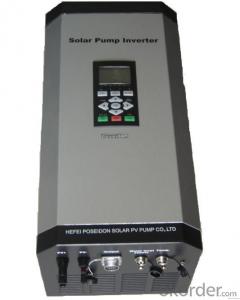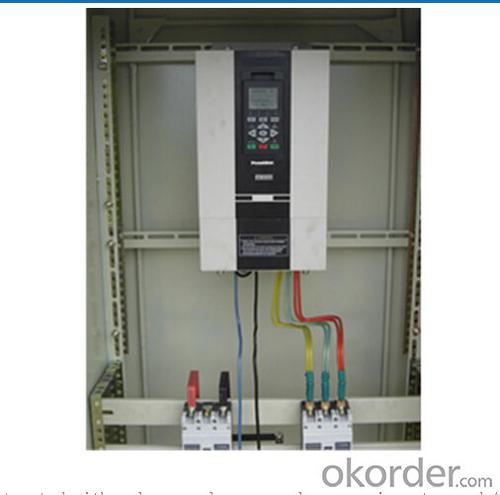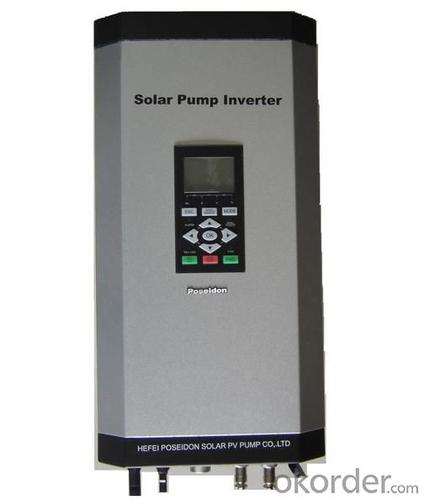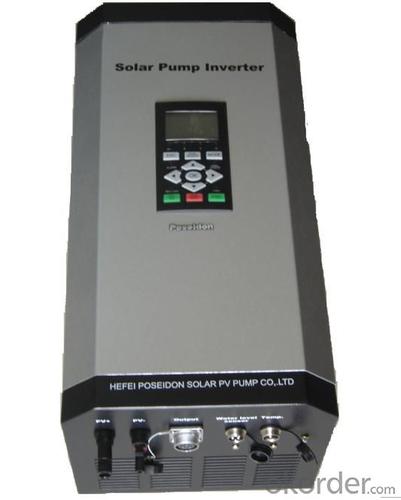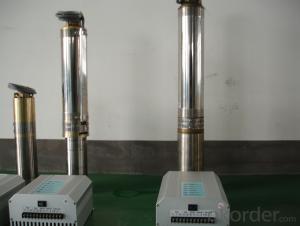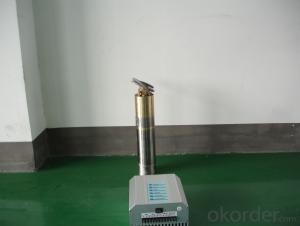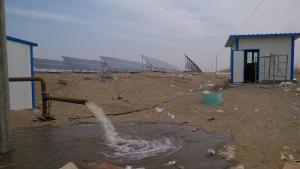1.5 Hp Solar Pump Inverter FCPM45KH
- Loading Port:
- China Main Port
- Payment Terms:
- TT OR LC
- Min Order Qty:
- -
- Supply Capability:
- -
OKorder Service Pledge
Quality Product, Order Online Tracking, Timely Delivery
OKorder Financial Service
Credit Rating, Credit Services, Credit Purchasing
You Might Also Like
Solar pump inverter FCPM45KH Product Description:
Solar water pumping system is constructed with solar panel array,solar pump inverter and AC water pump, DC current produced from solar panel will be delivered to solar pump inverter,and it will convert it into AC current to drive water pump,and will automatically regulate output frequency according to sun radiance intensity,maximally realize MPPT tracking function.
Features
Adopting the proposed dynamic VI maximum power point tracking (MPPT) control method, with fast response, and reliable operation, achieves efficiency of 99%.
Designed with variable frequency driver, greatly improves efficiency
Extremely high efficiency
Digital mode control, with automatic operation and manual operation mode options
Complete protection functions
Adopts intelligent IPM module, with high reliability
LCD display and operation panel, in real time presents operating data
Optional for water level measurement and control circuit
Applicable for general ACC pumps, like centrifugal pump, piston pump etc.
Independent intellectual property; Highly effective, the redundant reliability, exempts the maintenance and the long life.
The pumps are soft started, fully protected.
No batteries are used. So better Sunlight, more water.
Datasheet.
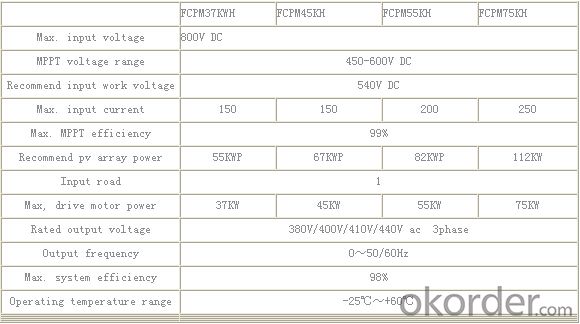
- Q: Can a solar pump be used in areas with high levels of chlorides in the water?
- Yes, a solar pump can be used in areas with high levels of chlorides in the water. Chlorides do not affect the functionality or efficiency of the solar pump. However, it is important to regularly monitor and maintain the pump to prevent any potential corrosion or damage caused by the chlorides in the long run.
- Q: Can a solar pump be used for residential swimming pool heating?
- Indeed, residential swimming pools can be heated using a solar pump. These pumps are specifically engineered to circulate water by harnessing the power of the sun, presenting an eco-friendly and economical solution for pool water heating. By utilizing solar energy, these pumps efficiently warm the pool water, ensuring a pleasant swimming experience without relying on conventional electrical or gas heating systems. Notably, solar pumps contribute to reducing carbon emissions and lessening dependence on non-renewable energy sources, thus highlighting their environmental friendliness. All in all, a solar pump proves to be a highly advantageous choice for heating residential swimming pools, offering both financial and ecological benefits.
- Q: Can a solar pump be used for fire-fighting purposes?
- Indeed, fire-fighting purposes can be served by utilizing a solar pump. In regions lacking electricity or during emergencies, solar-powered water pumps are widely employed. These pumps harness the energy from the sun to operate the motor, which subsequently propels the pump to move water. In scenarios involving fire-fighting, solar pumps prove invaluable as they can extract water from nearby sources like wells, ponds, or rivers to supply firefighters in their efforts to extinguish fires. These pumps are portable, simple to set up, and offer a dependable water source without the need for electricity or fuel. Nonetheless, it is crucial to acknowledge that the performance of a solar pump can fluctuate based on factors such as sunlight availability and pump capacity. Thus, it becomes imperative to ensure that the pump is appropriately sized and suitable for the specific demands of fire-fighting.
- Q: How does the installation of a solar pump affect property value?
- Property value can be positively impacted by the installation of a solar pump. A solar pump offers a cost-effective and environmentally friendly alternative to traditional water pumps that rely on electricity or fuel. By utilizing solar energy, it reduces energy expenses and provides a sustainable power source for water pumping. Homeowners and property buyers who prioritize reducing their carbon footprint and saving money on utility bills are increasingly embracing solar technology. Consequently, properties equipped with solar pumps are often viewed as more attractive and can attract potential buyers who value sustainability and energy efficiency. Furthermore, the installation of a solar pump can enhance the overall value of a property by enhancing its self-sufficiency and resilience. In areas where access to electricity is unreliable or costly, a solar pump guarantees a dependable water supply regardless of power outages or fluctuating energy prices. In addition, the installation of a solar pump can indirectly benefit property value. For example, a property with a solar pump is likely to have a well-maintained water system, crucial for agricultural properties or those in rural areas. This can increase the property's appeal to potential buyers who rely on a consistent water supply for farming, gardening, or other water-dependent activities. However, it is important to consider that the impact on property value may vary based on factors such as location, market trends, and the overall attractiveness of the property. Property owners should also weigh the initial cost of installing a solar pump against the potential increase in property value. In conclusion, the installation of a solar pump can have a positive effect on property value by promoting sustainability, energy efficiency, and resilience. It can attract environmentally conscious buyers and increase the property's desirability for those dependent on a reliable water supply. Nevertheless, the impact on property value should be considered in relation to local market conditions, and the costs and benefits should be carefully evaluated before making a decision.
- Q: Can a solar pump be used for water supply in a farm?
- Yes, a solar pump can be used for water supply in a farm. Solar pumps use energy from the sun to power their operation, providing a sustainable and cost-effective solution for water supply in remote agricultural locations. They can efficiently pump water from a well, river, or other water sources, making them ideal for irrigation, livestock watering, and other farm water supply needs.
- Q: Can solar pumps be used for firefighting or emergency water supply?
- Yes, solar pumps can be used for firefighting or emergency water supply. They are a reliable and sustainable option as they harness energy from the sun to operate, eliminating the need for electricity or fuel. Solar pumps can provide a continuous water supply in remote or off-grid locations, making them ideal for emergencies or firefighting situations where access to electricity or fuel may be limited or unavailable.
- Q: Can a solar pump be used for water treatment plants?
- Indeed, it is possible to utilize a solar pump for water treatment facilities. As an eco-friendly and economical alternative, solar pumps are increasingly gaining popularity in this field. By harnessing solar energy, these pumps effectively operate the water pumping system, eliminating the requirement for electricity from the grid or diesel generators. They serve a multitude of purposes in water treatment processes, including filtration, disinfection, and circulation. Particularly advantageous in distant or off-grid areas where electricity accessibility is scarce or inconsistent, solar pumps provide an exceptional solution. Furthermore, by implementing solar pumps, water treatment plants can significantly diminish their carbon emissions and operational expenses, demonstrating their commitment to environmental sustainability.
- Q: Can a solar pump be used in areas with high levels of radon in the water?
- No, a solar pump cannot be used in areas with high levels of radon in the water. Radon is a radioactive gas that can be harmful to human health, and it is important to avoid its exposure. Using a solar pump in such areas would not mitigate the presence of radon in the water, making it unsafe for consumption or use. A different water pumping solution should be considered in these circumstances.
- Q: Are there any limitations on the temperature range that solar pumps can operate in?
- Yes, there are limitations on the temperature range that solar pumps can operate in. Solar pumps are designed to work in specific temperature ranges, typically between -40°C to 60°C (-40°F to 140°F). Extreme temperatures outside of this range can negatively impact the performance and efficiency of solar pumps.
- Q: Can a solar pump be used for water supply in remote communities?
- Certainly, water supply in remote communities can be effectively facilitated by the use of solar pumps. These pumps offer an exceptional solution for delivering water in areas where access to electricity or grid infrastructure is absent. Powered by solar energy, they exhibit high efficiency, affordability, and environmental friendliness. The installation of solar pumps in remote communities allows for the extraction of water from underground sources, such as wells or boreholes. These pumps can cater to a wide range of water needs, including drinking, irrigation, livestock, and domestic usage. They can be tailored to accommodate various flow rates and lift heights, depending on the specific demands of the community. A notable advantage of solar pumps is that they operate without the need for any fuel or electricity, thereby reducing operational costs and reliance on external energy sources. Additionally, these pumps require minimal maintenance and can function for extended periods without significant issues. Consequently, they serve as a dependable and sustainable solution in remote communities, where regular maintenance and access to spare parts may pose challenges. Moreover, solar pumps can be integrated with storage systems, such as tanks or reservoirs, to ensure uninterrupted water supply even during periods of low sunlight or at night. Excess solar energy can be stored for utilization during non-sunny periods, guaranteeing a consistent water supply for the community. In conclusion, solar pumps prove to be an ideal choice for water supply in remote communities. They offer a reliable, cost-effective, and sustainable method of accessing clean water in areas with limited infrastructure or energy resources. By harnessing the power of the sun, solar pumps hold the potential to significantly enhance the quality of life and foster development in remote communities.
Send your message to us
1.5 Hp Solar Pump Inverter FCPM45KH
- Loading Port:
- China Main Port
- Payment Terms:
- TT OR LC
- Min Order Qty:
- -
- Supply Capability:
- -
OKorder Service Pledge
Quality Product, Order Online Tracking, Timely Delivery
OKorder Financial Service
Credit Rating, Credit Services, Credit Purchasing
Similar products
Hot products
Hot Searches
Related keywords


